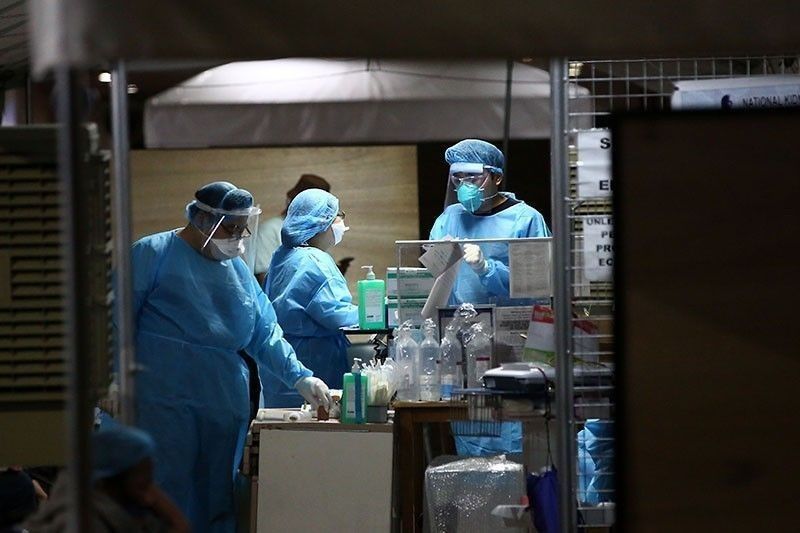Philippines eyes January for vaccine purchase but global supply already taken

MANILA, Philippines — Most contracts for the purchase of possible coronavirus vaccines could be signed by January next year, a senior administration official said Monday, who also reported that the majority of the available doses have been secured by other countries.
The Philippines has so far 2.6 million doses from the British-Swedish pharmaceutical AstraZeneca. But it was through the efforts of the private sector that the deal was inked, with firms raising P600 million that would, in turn, be donated to the health department for distribution.
At a Palace briefing today, vaccine czar Carlito Galvez Jr. said the country is still awaiting the emergency use authorization for the drugmakers, which is needed to tap funds loaned from multilateral sources such as the Asian Development Bank and the World Bank.
"Nakikita natin na karamihan sa ating pirmahan is pinipilit naming magkaroon ng initial success this December and mostly mga January," he said. "Dahil kasi 'yung ating mga kino-kontrata na mga vaccine ay magkakaroon ng tinatawag na EUA this coming January pa."
(We are trying to secure the deals and even achieve initial success this December, and mostly it would be by January. This is because the EUA for vaccine makers is seen to arrive the earliest at January.)
Finance Secretary Sonny Dominguez said in a meeting with the coronavirus task force in November that government could have at least P73.2 billion for buying the vaccines, but most of this would come from borrowing.
For one, the ADB and the World Bank have both agreed on "low cost, long-term" loans giving the Philippines P40 billion, while P13.2 billion would come from bilateral sources or countries such as Britain and the United States.
The remaining P20 billion, Dominguez said, would be shelled out from domestic sources or the Land Bank of the Philippines, Development Bank and government-owned and controlled corporations.
President Rodrigo Duterte on December 2 signed an executive order giving the Food and Drug Administration the power to issue the EUA for COVID-19 drugs and vaccines, a move that is seen to fast track the regulatory approval for the vaccines' use.
"Kapag lumabas 'yung EUA, 'yun ang pinaka-cue natin [kasi] lahat ng procurement natin will be through multilateral arrangement...and they require 'yung tinatawag nating stringent regulatory compliance," Galvez said, adding that the vaccines could arrive in the country by March.
(We will take the EUA as our cue once it is out because our procurement will be through multilateral arrangement and they require stringent regulatory compliance.)
Belated purchase or income gap?
A global tracker for countries' purchase of COVID-19 vaccines has reported that 9.6 billion doses are already reserved as of December 11, even before any vaccine candidate is put out in the market.
"Before any vaccine candidates are even approved for market, confirmed purchases cover 7.2 billion doses, with another 2.4 billion doses currently under negotiation or reserved as optional expansions of existing deals," per the Duke Global Health Innovation Center.
Further showing the gap is that high-income countries have secured 3.9 billion doses, upper middle-income nations with 1 billion doses, while lower middle-income countries have 1.6 billion doses, further showing the gap.
"While this makes sense from the perspective of an individual country, it leads to deep inequities in terms of global allocation. While some middle- and lower-middle income countries are represented here with direct deals, none of them have enough to vaccinate their entire populations," the tracker's report continued.
At the same briefing, Galvez also said that 80% of the vaccines have been taken by countries with better financial standing. He also denied that government was caught off guard and was late in finding ways to secure doses.
"Hindi siya late," he said. "'Yung tinatawag nating delivery of the vaccine is not only dependent on the procurement process. It is dependent on the global supply chain."
He did not mention that President Duterte only recently agreed to advancing payments for vaccines from pharmaceutical companies in the West, as he earlier expressed relying on China and Russia to supply the doses.
Government is looking to inoculate some 24.7 million Filipinos in the first stage of its vaccination program, with health workers at 1.76 million to be prioritized.
This is followed by workers in the public sector, as well as senior citizens or the most vulnerable to COVID-19, and state forces accounting for more than half a million.
- Latest
- Trending





























